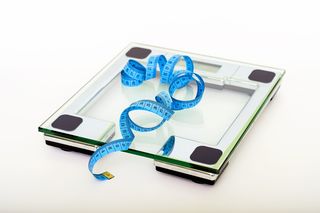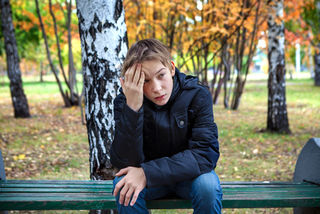How Do We Grow Through Challenges?
5 strategies to help you evolve and gain wisdom through COVID-19.
With so much uncertainty right now, one thing is for sure: I don’t want COVID-19 to be a thing of the past without positively being impacted by it. I want to feel like I was here for the coronavirus pandemic, and not just in body, but in presence. I want to know that I was awake as I surfed this wave, and maybe even developed some wisdom as a byproduct of going through something so tough, as we often do when challenged.

challenges can bre great gifts, when met with intention.Source: Pixabay / No Attribution Required
To develop insight, it helps to be awake for the breadth of the experience: the good, the bad, and the ugly. “Being awake” means creating awareness around our thoughts, emotions, and body sensations as we travel through the hardship. If there is grief, it is feeling the intricacies of this phenomenon. If there is worry and uncertainty, it is feeling them too, in all their complexity.
At a meditation retreat that I was on not that long ago, the leader quoted this amazing line from a short story written by James Joyce, an early 20th-century Irish author, entitled “A Painful Case.” The phrase goes as follows: “Mr. Duffy lived a short distance from his body.” Just let that sink in for a moment. Profound, right? I absolutely love this quote. It reflects how so many of us live through the stories our mind produces about what is happening, without really experiencing what is coming our way.
A benefit of living with awareness and not getting caught up in the narrative of our minds is that we often develop tremendously when we are here for what is happening. We learn a lot about what we are made of: our strength, grit, compassion, purpose, and resilience. We discover what values are actually important to us and which ones aren’t. We begin to understand what it means to "dig deep" within ourselves to weather the storm.
How many of you can look back in time and identify experiences you have had that you were not present for? Times in your life that you were so caught up in the cognitive experience of the anxiety and stress that you missed all the moments: the hard ones and the ones holding power and joy? I know I can.
Surprisingly, many of us coast by and pay little attention to what is happening, regardless if the situation is happy or painful. We often sleep through our own party (read: life). Sure, our bodies may be present and going through the motions, but our awareness is not there. Our mind is often busy with a story about the past, future, or ruminating in an unhelpful way about the present.
I remember a client describing to me her experience of getting a new puppy. She explained wistfully that those short puppy months went by quickly, and when her dog was a bit older, she regretted that she wasn’t more present for the puppy months. She was caught up in all the “doing” of his care, that she spent little time just “being:” with the stresses and the pleasures.
I’ve heard other stories of remorse from friends and clients in not having been present for important -albeit stressful- life happenings. For example, it’s common for new parents to describe ‘checking out’ for the newborn phase, or people zoning out during other difficult times such as when a loved one is sick. You know the phrase, “wake me up when this is over?” It’s like that.
While the temptations of taking a snooze when the going gets rough are certainly understandable and appealing on some level, when we do this there is often regret on the other side for not having really lived through the experience. Often, in these ‘big wave’ moments (times of intense feeling and emotion), there are many opportunities for connection, growth, and awe. Riding the big waves and not getting caught up in our mind’s narrative of them creates an opening to live a life that is rich with self-discovery.
We are all, right now, riding a very big wave. We are collectively experiencing an unprecedented time of grief, uncertainty, and fear. There is job loss, educational challenges, death, and also…what else? Can you find elements of the power of community, resilience, family, and love? You may be noticing a gamut of feelings in response to what is happening. Thus, this time holds a tremendous opportunity for change and growth.
With so much uncertainty right now, one thing is for sure: I don’t want COVID-19 to be a thing of the past without positively being impacted by it. I want to feel like I was here for the coronavirus pandemic, and not just in body, but in presence. I want to know that I was awake as I surfed this wave, and maybe even developed some wisdom as a byproduct of going through something so tough, as we often do when challenged.
challenges can bre great gifts, when met with intention.Source: Pixabay / No Attribution Required
To develop insight, it helps to be awake for the breadth of the experience: the good, the bad, and the ugly. “Being awake” means creating awareness around our thoughts, emotions, and body sensations as we travel through the hardship. If there is grief, it is feeling the intricacies of this phenomenon. If there is worry and uncertainty, it is feeling them too, in all their complexity.
At a meditation retreat that I was on not that long ago, the leader quoted this amazing line from a short story written by James Joyce, an early 20th-century Irish author, entitled “A Painful Case.” The phrase goes as follows: “Mr. Duffy lived a short distance from his body.” Just let that sink in for a moment. Profound, right? I absolutely love this quote. It reflects how so many of us live through the stories our mind produces about what is happening, without really experiencing what is coming our way.
A benefit of living with awareness and not getting caught up in the narrative of our minds is that we often develop tremendously when we are here for what is happening. We learn a lot about what we are made of: our strength, grit, compassion, purpose, and resilience. We discover what values are actually important to us and which ones aren’t. We begin to understand what it means to "dig deep" within ourselves to weather the storm.
How many of you can look back in time and identify experiences you have had that you were not present for? Times in your life that you were so caught up in the cognitive experience of the anxiety and stress that you missed all the moments: the hard ones and the ones holding power and joy? I know I can.
Surprisingly, many of us coast by and pay little attention to what is happening, regardless if the situation is happy or painful. We often sleep through our own party (read: life). Sure, our bodies may be present and going through the motions, but our awareness is not there. Our mind is often busy with a story about the past, future, or ruminating in an unhelpful way about the present.
I remember a client describing to me her experience of getting a new puppy. She explained wistfully that those short puppy months went by quickly, and when her dog was a bit older, she regretted that she wasn’t more present for the puppy months. She was caught up in all the “doing” of his care, that she spent little time just “being:” with the stresses and the pleasures.
I’ve heard other stories of remorse from friends and clients in not having been present for important -albeit stressful- life happenings. For example, it’s common for new parents to describe ‘checking out’ for the newborn phase, or people zoning out during other difficult times such as when a loved one is sick. You know the phrase, “wake me up when this is over?” It’s like that.
While the temptations of taking a snooze when the going gets rough are certainly understandable and appealing on some level, when we do this there is often regret on the other side for not having really lived through the experience. Often, in these ‘big wave’ moments (times of intense feeling and emotion), there are many opportunities for connection, growth, and awe. Riding the big waves and not getting caught up in our mind’s narrative of them creates an opening to live a life that is rich with self-discovery.
We are all, right now, riding a very big wave. We are collectively experiencing an unprecedented time of grief, uncertainty, and fear. There is job loss, educational challenges, death, and also…what else? Can you find elements of the power of community, resilience, family, and love? You may be noticing a gamut of feelings in response to what is happening. Thus, this time holds a tremendous opportunity for change and growth.

Source: Kanenori/Pixabay
How do you want to reflect on this pandemic when it’s over?
Living without regret is about being present and intentional: Have you met every day that you were gifted? And how did you meet that day? Were you responsive and in your body, opening yourself up to the lessons and wisdom that were presenting themselves to you? Or were you checked out of your body, stuck in your thoughts, and reactive or dissociative? Going through experiences in this mode is often where remorse stems from. The flip of that, undergoing hardship with a sense of alertness and spaciousness, often leads to positive change.
This doesn’t mean we need to come out of this experience with magical lessons, ‘aha moments’ (though it’s certainly nice if we do, at least a little bit), or finding silver linings (there is a time and a place for that, and there is a time for grief and mourning). All we’re aiming for is to know that we were there. We lived through Pandemic 2020 with our eyes wide open, enough so that this is something we can write heartfelt stories about when we are older, or tell anecdotes to our young children when they are grown.
As we are weathering this current worldwide tsunami, how can we achieve and ensure we emerge on the other side whole, intact, wiser and humbled? The following are five ideas:
1. Do daily check-ins with yourself. Ask yourself, where are my thoughts right now? What feelings am I having? How is my body feeling? You can try doing this multiple times a day, and at set times so you remember. For example, before you get out of bed you may want to check in with yourself, then again at lunchtime and again at bedtime before you go to sleep.
2. Notice the small moments of beauty and pleasure in any given moment. They are there, I guarantee you, even in the hard bursts. If you tune in, you will find them. You may even want to write them down so you have a log of all the beautiful moments that are happening in your life right now, alongside the stressful times and feelings.
3. Make the most of your down-time. Read that book you’ve had on your night table for months. Learn something new. By doing this, not only will you have tangible evidence that you grew during this experience, but you will be developing a sense of mastery. Building skill and knowledge in a specific area of interest is a wonderful way of coping with stress and uncertainty.
4. Keep a journal or a scrapbook of this time. At the end of the week, or at the end of the day, write down stories of your own strength. How you have adapted? How you have been flexible? How have you dealt with challenges that came up? What did you struggle with? How did you show up for yourself and your feelings? This can act as an archive of stories of your bravery as you lived through COVID-19. A client of mine told me she was going to start keeping a scrapbook of what it is like living right now- a time capsule of sorts. She is also crafting vision boards in her scrapbook as a way of maintaining the perspective that this will pass and all that she still has to look forward to.
5. Make memories. A teenage client of mine shared that she and her sibling had a mud fight with each other outside, for fun. We laughed at the silliness of this act, and reflected that if she wasn’t “stuck at home with nowhere to go and nothing to do” she would never have entertained such an activity, with her younger brother no less. But out of their shared boredom, this idea was born, and now they have a great memory that they will surely talk about as adults. Think about making memories, solo, or with your family. Be playful and silly with each other and yourself. Doing so will allow you to look upon this time with some wistful nostalgia when it’s all done.
When this uncertain and in many ways painful chapter is over, you will be the historian of your life during COVID-19. What can you do right now so that when it is a memory, you will recall the elements of pain and suffering, but also those of profundity and gratitude, knowing you were awake, alive, and positively changed by this episode of your life?
Leah Katz Ph.D. Here We Are Why I Broke Up with My Scale
Research suggests that as much as 80% of women struggle with poor body image, and 70% of women who are at healthy weights want to be thinner. Body image trouble can lead to a host of other difficulties, such as depression, anxiety, and eating disorders.

In my clinical practice, I see repeatedly how harsh many of the women and teenagers I work with are with their bodies, but this article is about my own journey with body image and weight. I always assumed I had a sound body image.I felt good about myself, kept active, and maintained a healthy BMI. I knew several family members and friends who suffered from different forms of eating disorders, and I felt grateful to have fallen on the other side of the fence, having not developed one myself.
However, I had a rude awakening about how harsh my own thoughts could be towards my body while I was on my first ever meditation retreat a few years ago. Although I didn’t have any observable signs of poor body image, I carried an overwhelming amount of discreet negative thoughts directed at my appearance.
I noticed the onslaught of negative thinking I had in response to walking past a mirror. I didn’t focus on my face, my eyes, or my smile, and instead got so picky with myself. Why do I have pimples and the start of wrinkles at 30? Oh my, when did my thighs get so huge? I really shouldn’t have worn those leggings. I need to start eating less. And these thoughts were happening with alarming frequency in the brain of a woman who had always assumed she felt great in her body.
Practicing mindfulness helped me shift my relationship to these painful thoughts. I started to notice them as they occurred. Instead of automatically believing them, as I had been doing for years, I learned to recognize them for what they were: sad thoughts cultivated through years of exposure to unhealthy messages about my weight and body. Not the truths I had come to understand them to be.With this shift in my awareness, now when these thoughts appeared, I would notice them, gently let them pass, like clouds in the sky, instead of following them down a rabbit hole of other thoughts and feelings that left me feeling disconnected and upset with my body.I cultivated a greater sense of gratitude for the miraculous body I was given and developed awe for what was happening within and beneath my skin. I began to observe my body in motion- grateful for the simple (or not so simple) acts of being able to walk, run, stretch. I was gentler with how I handled my physical self in such acts as applying moisturizer to my face. I focused on being healthy rather than ‘skinny.’ I looked deeply into my own eyes (on occasion) and affirmed how much I loved myself.All of these practices are beautiful and helped to a great extent. I gained tremendous self-awareness of the degree of negative chatter occurring in my mind about my physical appearance and learned to both detach from the thoughts and create healthier, more gratitude-based thinking about my body- both the external and internal aspects.But curating positive thoughts without action has its limitations. Though I was learning to observe my thoughts instead of being swept away by them, I was still having them. A lot. Much of the perpetuation of these thoughts had to do with a pesky little device that lay in the corner of my bathroom. You got it. My scale.
You see, when we invest energy in practicing mindfulness and self-development, yet still engage in unhealthy behavioral rituals (for me, weighing myself daily), then we are still reinforcing old, unhealthy beliefs. In my case, these beliefs were the overemphasis of my weight, and what I interpreted this to mean about myself.
And then came a point not that long ago where I had had enough. It was time to take action against these uncomfortable judgments. At that time, my daughter was 4 and I didn’t want to perpetuate the culture of poor body image that I had grown up with. I didn’t want her to have a mother who would weigh herself and then mutter something rude to herself about that number. (Even though she had never actually witnessed this, children pick up on subliminal things.) I needed to take steps to develop a truly loving, respectful relationship with my body.

For my sake, and for hers, I decided it was time I broke up with my scale.Now for full transparency, we actually broke up once, got back together briefly, and then had a final breakup. The first time we broke up, I must admit, I asked my husband to take the scale away. Hide it from me so I wouldn’t be tempted to sneak in a visit. And he obliged, put it away in what he thought was a clever hiding space.That worked for a few days. Then I noticed the creeping curiosity slink in and trick me with its masked logic. What did I weigh? My pesky thoughts would say. Is having my scale away affecting my weight at all? As a researcher, shouldn’t I have access to this data? (Did you catch that irony there?) And so, I’m embarrassed to say, I searched and found it, took it back out in its grey metallic glory, and resumed my daily habit.
I quickly caught my lapse, and this time, put the scale away myself. I didn’t need fancy tricks or someone else to take responsibility for getting me to get healthier with my body. No. That obligation fell squarely on my shoulders. If I was going to learn to feel better about myself, that duty was mine and mine alone. So, away the scale went.
Not weighing myself was not a magical fix. But, I noticed a lightness, a freeness. I no longer engaged in the daily judgment or self-flagellation that came with gaining a pound (or conversely, the celebratory feelings of accomplishment when I had lost a pound). I enjoyed my food more because I wasn’t thinking in the back of my mind about how what I was eating would affect my weight- because I knew I wouldn’t be hopping on the scale the next morning. It was easier to slow down and savor what was going in my mouth because I was limiting the immediate association I had formed between what I ate and my weight.When I ate, I asked myself more often, what is my body craving, and learned to pay better attention to my cues when I was full. I noticed I really didn’t feel that good when I ate late at night, and would try and curb that impulse- not because I was afraid of what the scale would say, but because I was tuning in to what my body was saying. I began to pay attention to my body and trust it in a way that the flashing number only diminished.
With the scale away, the mindless, daily act of weighing myself is no longer an option. When I feel the urge, I work through it with counteracting worry thoughts with healthier, grounded ones. I remind myself that my self-worth, and physical health for that matter, go far deeper than the number on any scale. I remind myself that I am keeping myself healthy with eating well, physical exercise and meditation, which are better indicators of health than weight. (Of course, check in with your medical provider if there is a medical reason for keeping your scale around).
If you feel weighted down by your scale (pun intended), and think a break up may be helpful, try doing it this way: Thank the scale for whatever it has offered you. Then recognize it for what is: a mechanical device designed to give you a number. Nothing more, nothing less. Reassure yourself that you are capable of taking it from here as you focus on building a stronger, healthier relationship with your body. And then, set the scale aside, and allow yourself to feel lighter and more empowered as you step into greater self-worth.
The Dos and Don'ts of Parenting Your Child Through COVID-19
How to emotionally support your anxious child through this health scare.
Anxiety over the coronavirus (COVID-19) has been steadily building these last several weeks. Many of you have likely lived through other global health scares before. Swine Flu (remember H1N1?), West Nile Virus, SARS, and Ebola are some of the few that come to my mind.Having experienced other large-scale health concerns may serve as reassurance that these alarms come to pass. You can tell yourself, remember when that last alarm happened? It passed; it was scary, and we were ultimately OK. We can also use our prior knowledge of the media’s tendency towards dramatizations and challenge the hysteria the media promulgates in much of the coverage they provide on pressing issues. In this case, their reportage of COVID-19.
Generally, past experiences provide a logical counter-balance to new anxieties that arise over fresh situations. However, while you may be familiar with the apprehension surrounding a health or catastrophic event and use past events to challenge your current fears, your children don’t have this same history and frame of reference. That makes it a different, scarier experience for them. Add in a child with preexisting anxiety, and you have a recipe for one extremely anxious child. Their life may be disrupted because of this scare: Sleep disturbances, diminished school attendance, and preoccupations with getting sick may be some issues you are noticing in your anxious child.

Therefore, it is important all of us parents take a pause and mindfully parent our children through this alarm.In helping our children emotionally through this health scare, the following is a list for parents on the "dos" and "don’ts" of parenting your child through the coronavirus:Do:1. Check your own anxiety. This is a big one. If you are feeling overwhelmingly anxious about the virus and not working through your feelings, this will most certainly rub off on your child.
Talk to someone if you feel anxious. Check your facts. Reframe catastrophic scenarios in your mind. Take deep breaths. But whatever you do, don’t allow your anxiety to fester and ooze. Your child will pick up on it, guaranteed, and this may act as a barrier in them seeing you as a possible support for them if and when they feel anxious
2. Talk with your school-age children (but don’t go overboard). Children, even younger ones, know when something is off. Not talking about what is happening, either because you are feeling anxious or are worried about making them anxious, often backfires and only makes them more worried.Be reassuring. Ask them how they are feeling emotionally and listen to their answers. Don’t brush away what is happening, that they are already aware of, under the carpet.3. Remind them of where their power lies. Often in times of stress that feels beyond our control, we feel powerless, helpless, and like there is nothing we can do to support ourselves. We give up on finding solutions and give in to our anxiety.Remind your children (and yourself, if necessary) that they maintain plenty of power—and where to find it. Their power lies in things like handwashing, not touching their face, not sharing snacks, and using a tissue. There is something both empowering and comforting in learning to find where we can take our own responsibility in a situation where there is much out of our control.
4. Use this as an opportunity to discuss gratitude. For their health, for living in a country where medical help is readily available, for the invention of medicine that can control and treat symptoms.5. Lead by example. If you are asking your children to wash their hands more often or not to touch their faces, try your hardest to practice what you preach. It will give you more empathy around what you are asking them to do, and modeling these behaviors will be your children’s best teacher.
Don’t:1. Have adult conversations about the coronavirus in front of them. Even when you think their attention is otherwise engaged, they are listening. Children are sponges: If they are in the vicinity, they pick up and hear almost anything.I still get a kick out of observing this in my own children. My husband and I can be talking about something mundane and boring, and as soon as we say “ice cream” or “movie,” my children pipe up immediately. Save your conversations—especially the worried ones—for when your children are not present.
2. Go overboard with cleaning. I’ll never forget how the mother of a childhood friend of mine (who, granted, came from a large family) would go overboard each time one of her children got sick—even with the common cold. She would follow them around with disinfectant spray, carry paper towels around with her, and make everyone feel tense and worried. Don’t do this to your children.Do prepare according to CDC guidelines, but make it feel natural and not fatalistic. As you stay on top of your and your children’s hygiene, remind them that regardless of a health outbreak, it is important to keep our hands and surfaces clean.3. Brush your children’s fears away. There is a difference between offering reassurance and being dismissive. An example of a dismissive response would be: What are you afraid of? Things are going to be fine. Reassurance includes both emotional attunement and coaching. It sounds like, I understand you are worried. Can you tell me more about how you are feeling and what you are worried about?
Only after that emotional attunement has happened, offer some reassurance, such as, I see you’re worried. I have seen many other health scares. I know the media tends to make it sound really scary, but it’s usually like that with the news. I have always been fine, and I’m confident we will be fine through this. Know I am here to talk if you are worried.
4. Blindly follow the media hysteria. Do get your facts straight. Do your own research—from reputable sites. Be careful what you read in the news, and how much exposure you’re getting to the scary stuff. Scientifically, this has been shown to affect you. I’ll say it again for emphasis: Get the facts, educate yourself, and allow that to guide you.Copyright: Leah Katz, 2020. This article also appears in the March 18th issue of the Jewish Review.






